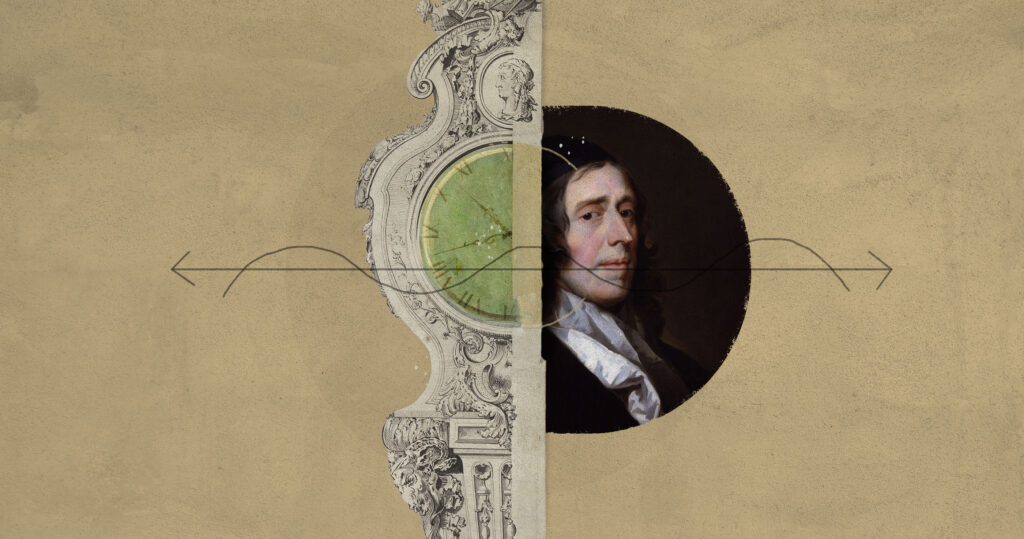Religion Makes Each Previous and Future Mercies Current to the Soul

“Religion offers a gift subsistence, to forepast1 works as recorded, and future mercies as promised, to help the soul in an evil day.”2
The apostle tells us, that “religion is the substance of issues hoped for, the proof of issues not seen” (Heb. 11:1).
-
“Of issues hoped for”: it seems to be ahead to the guarantees, and so offers the substance of them in current possession, so confirming our minds and hearts, that they could have a subsistence because it had been inside us, although not really made out unto us.¶3
-
It’s “the proof of issues not seen”: it extends itself not solely to issues promised, however taking for its object the entire phrase of God, it makes evident, and current, issues which are previous additionally.¶
The religion recommended, is of issues lengthy since completed, even the making of the “issues which are seen” of the “issues that don’t seem” (Heb. 11:3). “Abraham noticed my day,” says our Savior (John 8:56). He noticed it as Habakkuk noticed the tents of Cushan in affliction (Hab. 3:7). Religion made it current to him: all of the ages between him and his promised seed had been as nothing to his keen-sighted religion. Therefore the apostle places the mercies of the promise, multi functional type and rank as already wrought, although a few of them had been loved and a few of them on this life can’t be. “Whom he hath justified, them he hath glorified” (Rom. 8:30): he has completed it for them already, as a result of he has made them consider it, and that provides it a gift subsistence of their spirits. And for forepast works, they’re nonetheless talked about by the saints, as if they’d been completed of their days, earlier than their eyes. Elisha calls as much as remembrance a former miracle, to the effecting the like (2 Kings 2:14).
Quantity 18 consists of 5 sermons that Owen delivered at a time of civil conflict, addressing issues corresponding to windfall and toleration. It has been edited for contemporary readers by Martyn C. Cowan.
There be three issues, up to now, or future mercies, which religion makes current to the soul, giving within the substance of them, (1) their love, (2) their comfort, (3) their use and profit.
(1) The love of them: the love that was in former works, and the love that’s in promised mercies, that religion attracts out, and actually makes ours. The love of each recorded deliverance, is given to us by religion. It seems to be into the goodwill, the free grace, the loving-kindness of God, in each work that ever he did for his, and cries, “But that is mine: that is the kernel of that blessing, and that is mine: for a similar good-will, the identical kindness he has in direction of me additionally. Have been the identical outward actings needful, I ought to have them additionally.” The free love of each mercy is religion’s correct object. It makes all Joshua’s nice victories, current to each one in every of us. The promise that had the love and beauty in it which ran by all of them, is given him: “I might be with thee, I cannot fail thee, nor forsake thee” (Josh. 1:5). Now the apostle tells us, that the reality and love of this promise is ours (Heb. 13:5). Religion could, does guarantee itself, that what goodwill soever, was in all the nice mercies which Joshua acquired upon that promise, is all ours. All of the goodwill and selection love of, “I’ll by no means depart thee nor forsake thee,” is mine and thine, if we’re believers. He that has this current, has all Joshua’s victories current. The very glory of the saints in heaven is ours within the love of it. We take pleasure in that love, which gave them glory, and can crown us additionally in due time.
He that believes in Christ, by that believing receives Christ, he turns into his.
(2) Of their comforts and refreshments. “Thou gavest leviathan to be meat to the folks within the wilderness” (Ps. 14).4 They fed their souls stuffed with the sweetness of that mercy, the destruction of their oppressing tyrant: we chew the cud upon the blessings of former ages. Who has not with pleasure, delight, and raised affections, gone over the outdated preservations of the church in former years? How does David run them over with admiration, closing each cease with, “His mercy endureth for ever”? Psalm 136. And for issues to return, as but within the promise solely, whether or not normal to the entire church, because the calling of the Jews, the approaching in of the fullness of the Gentiles, the breaking out of sunshine, magnificence and glory upon the church buildings and saints, the confusion of countries not subjecting themselves to the usual of the gospel, and many others. or particularly, farther assurance of affection than presently loved, nearer communion with Father and Son, being with Christ, free of distress and corruption, dwelling with God for ever, how does religion act over these and the like issues within the coronary heart, leaving a savor and relish of their sweetness frequently upon the soul? O how candy are also the issues of the world to return unto poor believers! Christ leads the soul by religion, not solely into the chambers of presently loved loves, but additionally into the foreprepared eternal mansions in his Father’s home.5 Thus it offers poor mortal creatures, a candy relish of everlasting joys: brings heaven right into a dungeon, glory into a jail, a crown right into a cottage, Christ right into a slaughterhouse.
Two Causes for This Remark
Cause 1. From the character of religion: although it don’t make the factor believed to be (the act can not create its personal object), but making use of it, it makes it the believer’s. It’s the bond of union between the soul and the factor promised. He that believes in Christ, by that believing receives Christ (John 1:12), he turns into his. It’s a grace uniting its topic and object, the individual believing, and the factor believed. There wants no ascending into heaven or descending, the phrase of religion makes all issues nigh, even inside us (Rom. 10:6–7). Some glasses will current issues at a fantastic distance very close to: religion wanting by the glass of the gospel, makes probably the most distant mercies to be not solely in a detailed distance, however in union. It “is the subsistence of issues hoped for,” that which they haven’t in themselves, it offers them within the full-assured minds of believers.
Cause 2. From the intendment of all mercies: they’re for each believer. All issues are theirs, world, life, loss of life, issues current, issues to return (1 Cor. 2:22).6 All guarantees being made to each believer, and all mercies being the fruit of those guarantees, they need to all belong to each believer. Now if all these ought to be saved from us at that distance whereby they fail of their accomplishment in respect of time, what would they avail us? God subsequently has appointed that they shall have an actual, although not a pure presence and subsistence always, to all believers.
Two Makes use of from This Remark
Use the Previous to Rework the Current Use
Use 1. See therefore what use you make of previous mercies, deliverances, blessings, with promised incomings: carry them about you, by religion, that you could be use them at want: “The place is the God of Elijah”:7 “Awake, awake, O arm of the Lord,”8 and many others. “I noticed the tents of Cushan”: take retailer mercies together with you in each trial. Use them, or they’ll develop rusty, and never cross in heaven. Be taught to eat leviathan a few years after his loss of life. Overlook not your pearls, scatter not away your treasure, be wealthy in a heap of mercies, religion will make you so. The love, the consolation, the good thing about all former and future blessings are yours, if you understand how to make use of them. Oh how have we misplaced our mercies in each hedge and ditch! Have none of us ability to put up the final eminent deliverance towards a wet day?
Use the Future to Rework the Current
[Use] 2. Learn to make the poorest and most stricken situation, snug and stuffed with pleasure. Retailer your cottage, your sickbed, by religion, with all kinds of mercies. They’re the richest furnishings on the planet. Collect up what’s already forged out, and fetch the remainder from heaven. Convey the firstfruits of glory into your bosom. See the Jews known as, the residue of opposers subdued, the gospel exalted, Christ enthroned, all of your sins pardoned, corruption conquered, glory loved: roll your self in these golden streams each day. Let religion fetch in new and outdated: historical mercies, in your supportment, eternal mercies, in your comfort. He that has religion, has all issues.
Notes:
- I.e., bygone.
- Within the textual content: religion offers a gift, &c.—Owen. 107
- The ¶ image signifies {that a} paragraph break has been added to Owen’s unique textual content.
- The proper reference is Ps. 74:14.
- John 14:2.
- The proper reference is 1 Cor. 3:22.
- 2 Kings 2:14.
- Isa. 51:9.
This text is customized from Sermons and Tracts from the Civil Wars (1646–1649) (Quantity 18) by John Owen.
Associated Articles
Why John Owen and Richard Baxter Didn’t Like Every Different
After we see different folks, we accomplish that by a filter that operates on the idea of the one proof we’ve got: what we see them do and listen to them say. It’s simple to get that improper.
8 Ideas of Prayer from John Owen
There are some typically allowed ideas, which, although not all the time duly thought of, but can not at any time be modestly denied, that give course towards the best efficiency of our responsibility [of prayer] herein.
Alongside common preaching and instructing, John Owen produced many works, together with books on toleration, his monumental multi-volume writings on the Holy Spirit, and 4 giant folio volumes on Hebrews.
Podcast: The Life and Legacy of John Owen (Lee Gatiss)
Lee Gatiss walks us by the life and instances of the prolific theologian John Owen, introducing us to the person, his works, and his legacy.







